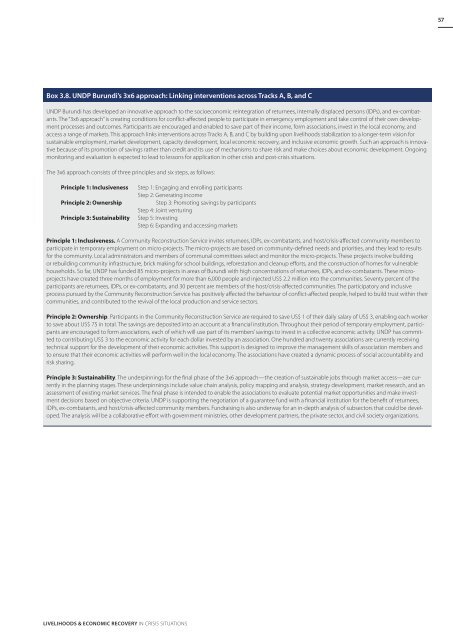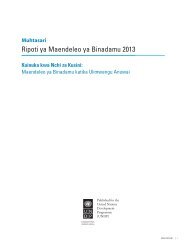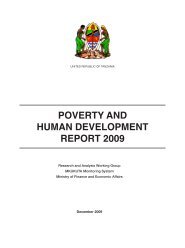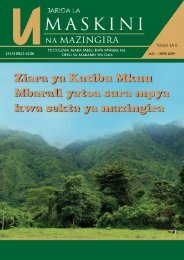Download PDF (4.08 MB) - ReliefWeb
Download PDF (4.08 MB) - ReliefWeb
Download PDF (4.08 MB) - ReliefWeb
Create successful ePaper yourself
Turn your PDF publications into a flip-book with our unique Google optimized e-Paper software.
57<br />
Box 3.8. UNDP Burundi’s 3x6 approach: Linking interventions across Tracks A, B, and C<br />
UNDP Burundi has developed an innovative approach to the socioeconomic reintegration of returnees, internally displaced persons (IDPs), and ex-combatants.<br />
The “3x6 approach” is creating conditions for conflict-affected people to participate in emergency employment and take control of their own development<br />
processes and outcomes. Participants are encouraged and enabled to save part of their income, form associations, invest in the local economy, and<br />
access a range of markets. This approach links interventions across Tracks A, B, and C by building upon livelihoods stabilization to a longer-term vision for<br />
sustainable employment, market development, capacity development, local economic recovery, and inclusive economic growth. Such an approach is innovative<br />
because of its promotion of savings rather than credit and its use of mechanisms to share risk and make choices about economic development. Ongoing<br />
monitoring and evaluation is expected to lead to lessons for application in other crisis and post-crisis situations.<br />
The 3x6 approach consists of three principles and six steps, as follows:<br />
Principle 1: Inclusiveness<br />
Principle 2: Ownership<br />
Principle 3: Sustainability<br />
Step 1: Engaging and enrolling participants<br />
Step 2: Generating income<br />
Step 3: Promoting savings by participants<br />
Step 4: Joint venturing<br />
Step 5: Investing<br />
Step 6: Expanding and accessing markets<br />
Principle 1: Inclusiveness. A Community Reconstruction Service invites returnees, IDPs, ex-combatants, and host/crisis-affected community members to<br />
participate in temporary employment on micro-projects. The micro-projects are based on community-defined needs and priorities, and they lead to results<br />
for the community. Local administrators and members of communal committees select and monitor the micro-projects. These projects involve building<br />
or rebuilding community infrastructure, brick making for school buildings, reforestation and cleanup efforts, and the construction of homes for vulnerable<br />
households. So far, UNDP has funded 85 micro-projects in areas of Burundi with high concentrations of returnees, IDPs, and ex-combatants. These microprojects<br />
have created three months of employment for more than 6,000 people and injected US$ 2.2 million into the communities. Seventy percent of the<br />
participants are returnees, IDPs, or ex-combatants, and 30 percent are members of the host/crisis-affected communities. The participatory and inclusive<br />
process pursued by the Community Reconstruction Service has positively affected the behaviour of conflict-affected people, helped to build trust within their<br />
communities, and contributed to the revival of the local production and service sectors.<br />
Principle 2: Ownership. Participants in the Community Reconstruction Service are required to save US$ 1 of their daily salary of US$ 3, enabling each worker<br />
to save about US$ 75 in total. The savings are deposited into an account at a financial institution. Throughout their period of temporary employment, participants<br />
are encouraged to form associations, each of which will use part of its members’ savings to invest in a collective economic activity. UNDP has committed<br />
to contributing US$ 3 to the economic activity for each dollar invested by an association. One hundred and twenty associations are currently receiving<br />
technical support for the development of their economic activities. This support is designed to improve the management skills of association members and<br />
to ensure that their economic activities will perform well in the local economy. The associations have created a dynamic process of social accountability and<br />
risk sharing.<br />
Principle 3: Sustainability. The underpinnings for the final phase of the 3x6 approach—the creation of sustainable jobs through market access—are currently<br />
in the planning stages. These underpinnings include value chain analysis, policy mapping and analysis, strategy development, market research, and an<br />
assessment of existing market services. The final phase is intended to enable the associations to evaluate potential market opportunities and make investment<br />
decisions based on objective criteria. UNDP is supporting the negotiation of a guarantee fund with a financial institution for the benefit of returnees,<br />
IDPs, ex-combatants, and host/crisis-affected community members. Fundraising is also underway for an in-depth analysis of subsectors that could be developed.<br />
The analysis will be a collaborative effort with government ministries, other development partners, the private sector, and civil society organizations.<br />
Livelihoods & Economic Recovery in Crisis Situations





